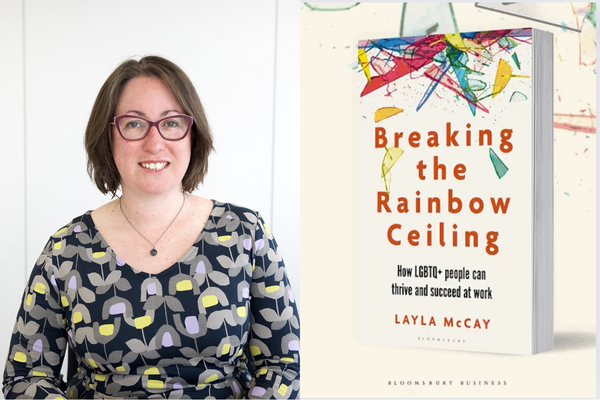During lunch with a former colleague about three years ago, author and policy leader Layla McCay learned something that shocked her: being an out lesbian once cost her a significant job opportunity.
“We all know people from minority groups are more likely to face prejudice and discrimination,” says McCay, in a phone interview with Tagg. “But it feels quite different when you see it so very overtly being applied to your own personal case,” she says.
THE RAINBOW CEILING
With this surprising news, McCay—a native of Scotland who now calls England home—became passionate about the “rainbow ceiling.” Echoing the glass ceiling concept often applied to women and people of color, the concept of a rainbow ceiling suggests that people are often professionally held back by being openly LGBTQ+. A curious professional with a medical degree, psychiatric training, and a role as Director of Policy for UK-based health member organization the NHS Confederation, McCay was uniquely placed to dive into the topic. Enter her new book, Breaking the Rainbow Ceiling: How LGBTQ+ People Can Thrive and Succeed at Work, which debuted in May.
Drawing on desk research, surveys, and interviews with just over 40 LGBTQ+ professionals from around the world in various industries, the book centers on how identifying as LGBTQ+ has professionally held people back and, conversely, how some people have found success while out of the closet. Among McCay’s interviewees are retired U.S. Army Major General Tammy Smith, and Jim Fitterling, Chairman and CEO of Dow, who’s one of just three out LGBTQ+ current Fortune 500 CEOs.

WORKPLACE WINS & STRUGGLES
One of several themes that emerged from McCay’s research is that, like McCay, many interviewees hadn’t fully realized how being out had impacted their professional lives. However, upon reflection, they had a lot to say—both positive and negative.
For example, Karen Teo, Vice President of Sales at Meta, said she was once pleasantly surprised when a colleague said her girlfriend could utilize the company health insurance.
“Just being seen and valued and recognized, and your needs being met for who you are—that had such an impact on [Teo] that she ended up doing really well in that company,” says McCay. “[It’s that feeling of] not having to hide . . . or modify yourself so that you are fitting into somebody else’s vision of what you ought to be,” she says.
Yet, even if some workplaces have benefits like Teo received, the world is rife with workplace policies that have the opposite of a feel-good effect. Those problematic circumstances include: workplace dress codes that don’t accommodate non-binary or fluid gender expression, health care benefits not explicitly covering transgender health care needs, or computer system flaws, such as what another of McCay’s interviewees encountered.
This interviewee recounted an incident in which she selected “lesbian” for an online HR form’s sexual orientation question, and the system then prompted her to provide start and end dates.
“There’s things that feel small,” says McCay. “But if you get them wrong, people feel like . . . they don’t quite belong—like their particular situation has not been taken into account.”
When people feel such exclusion, McCay says they might not fully engage in their work or with others in the workplace. This means they’re not able to give their best effort, which in turn might prevent them from earning promotions, and affect the productivity of a whole team or company.
Problematic exclusion doesn’t just come from workplace minutia, either. It can also manifest as a larger issue. For example, there are very few high-level out LGBTQ+ professionals worldwide. This can make early-stage professionals think being an out leader is reserved for a select few, so they personally shouldn’t bother trying to be out and climbing the ladder. Some people feel they have to choose between being out or getting ahead.
A MORE INCLUSIVE FUTURE
In the book, McCay explores challenges driving this forced-choice notion, and how the challenges can be overcome. McCay hopes the book serves as a guide and comfort for early-career LGBTQ+ professionals, and a way for senior-level LGBTQ+ professionals to process their past and learn how to make things easier for their LGBTQ+ successors. But McCay is happy about a third audience the book has already drawn, too: managers and employees in general.
“Cisgender, heterosexual leaders have said ‘This has helped me be a better ally,’ ‘This is going to help me be a better employer,’” says McCay. “Every time I hear that it makes me want to cry, because it’s so wonderful.”
McCay knows the book isn’t going to immediately change everything. Obstacles are not only abundant within professional spaces, but also stem from external factors such as state- and nation-wide legal battles and false public perception that LGBTQ+ people don’t actually face a rainbow ceiling.
But McCay is passionate about the book’s purpose, including its underlying notion that coming out professionally is still hard to do, especially with the uncertainty of LGBTQ+ rights in the future, but it is also invaluable.
“Being publicly out about who you are, in all your glorious diversity, is a leap of faith,” says McCay. “It is a brave and courageous thing to do… but when we can do it, it can have this really powerful impact on us and on those who are coming next.”


